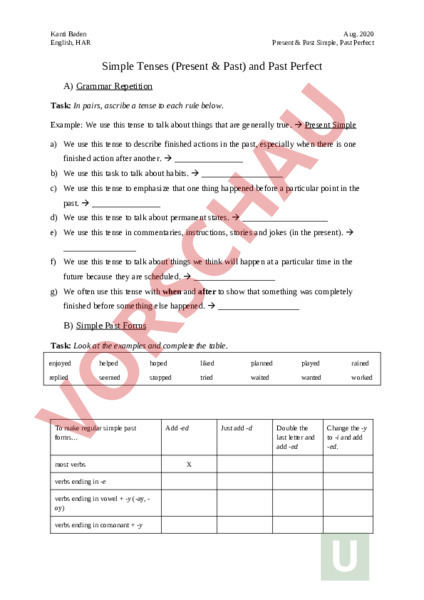Arbeitsblatt: Present Simple & Past simple
Material-Details
Arbeitsblatt zu Present Simple & Past Simple
Englisch
Grammatik
10. Schuljahr
1 Seiten
Statistik
196653
424
17
02.02.2021
Autor/in
Gelöschtes Profil (Spitzname)
Land:
Registriert vor 2006
Textauszüge aus dem Inhalt:
Kanti Baden English, HAR Aug. 2020 Present Past Simple, Past Perfect Simple Tenses (Present Past) and Past Perfect A) Grammar Repetition Task: In pairs, ascribe tense to each rule below. Example: We use this tense to talk about things that are generally true. Present Simple a) We use this tense to describe finished actions in the past, especially when there is one finished action after another. b) We use this task to talk about habits. c) We use this tense to emphasize that one thing happened before particular point in the past. d) We use this tense to talk about permanent states. e) We use this tense in commentaries, instructions, stories and jokes (in the present). f) We use this tense to talk about things we think will happen at particular time in the future because they are scheduled. g) We often use this tense with when and after to show that something was completely finished before something else happened. B) Simple Past Forms Task: Look at the examples and complete the table. enjoyed helped hoped liked planned played rained replied seemed stopped tried waited wanted worked To make regular simple past forms most verbs verbs ending in -e verbs ending in vowel -y (-ay, oy) verbs ending in consonant -y Add -ed Just add -d Double the last letter and add -ed Change the -y to -i and add -ed. Kanti Baden English, HAR Aug. 2020 Present Past Simple, Past Perfect short verbs ending in one vowel and one consonant C) Past Simple vs. Past Perfect Task: Choose the correct tense (simple past or past perfect) (go) went to Paris last spring for job interview; (not be) there for five years. (arrive) the evening before the interview, and (decide) to go for walk. (spend) happy hour strolling round, thinking about the good times (have) there as student. As was walking by the Seine, suddenly (see) familiar face – it was Nedjma, the woman (share) flat with when was student, and whose address (lost) after leaving Paris. could tell she (not see) me, so (call)her name and she (look) up. As she (turn)towards me, (realise) that she (have) an ugly scar on the side of her face. She (see) the shock in my eyes and her hand (go) up to touch the scar; she (explain) that she (get) it when she was photographer reporting on war in Africa. She (not be) uncomfortable telling me this; we (feel) as if the years (not pass), as if we (say) goodbye the week before. She (arrive) in Paris that morning, and she (have) hospital appointment the next day. The doctors (think) that they could remove the scar, but she would have to stay in Paris for several months. Both of us (have) the idea at the same time: if (get) the job, we could share flat again. And we could start by having coffee while we (begin) to tell one another everything that (happen) to us in the past five years. Add. Task: What happened to Nedjma in Africa. Tell her story from her perspective, use the correct past forms. Nedjma:
